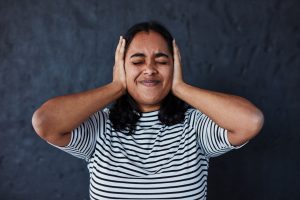When leaving a concert or a loud sporting event, it is common to feel like your hearing is off. Sounds may seem muffled, your ears may feel full or you may even experience a ringing in one or both of your ears. This sensation is known as temporary threshold shift (TTS).
What Causes Temporary Threshold Shift?
To understand what is happening inside your ears after a night out at Music Box, you first need to know how hearing works. When soundwaves enter your ear, they travel down the ear ca
nal, through the bones of the middle ear until they reach the inner ear. The soundwaves stimulate the fluid within the cochlea in the inner ear, which creates waves that cause the delicate hair cells that line the cochlea to move. Each of these hair cells is tuned to a specific frequency.
Sounds that are too loud push over these hair cells; they will then stay bent for some time even when there is no noise present. This leads to a feeling of fullness in the ear, tinnitus or even temporary hearing loss. Fortunately, TTN usually only lasts for a few hours, although some experience symptoms for up to a few weeks.
What Sounds Are Too Loud?
Sounds are measured in decibels (dB). Anything over 85 dB can lead to TTS, which is essentially a temporary type of noise-induced hearing loss. Below is a list put together by the National Institute on Deafness and Other Communication Disorders of the average decibel rating of familiar sounds:
- Normal conversation: 60-70 dB.
- Movie theater: 74-104 dB.
- Motorcycles: 80-110 dB.
- Sporting events and concerts: 94-110 dB.
- Sirens: 110-129 dB.
- Fireworks show: 140-160 dB.
Is TTS Permanent?
The answer to this question is complicated. While the immediate hearing loss and tinnitus you experience following an event usually goes away, if you’re frequently putting yourself in a position where your ears are at risk of TTS, there are long-term consequences. Over time, temporary threshold shift can become permanent.
Can You Prevent TTS?
The best way to prevent temporary threshold shift is to avoid exposure to loud noises. If you come into contact with dangerously loud sounds, you should always wear hearing protection.
To learn more about preventing TTS or to schedule an appointment with a hearing professional, contact San Diego Hearing Center today.
